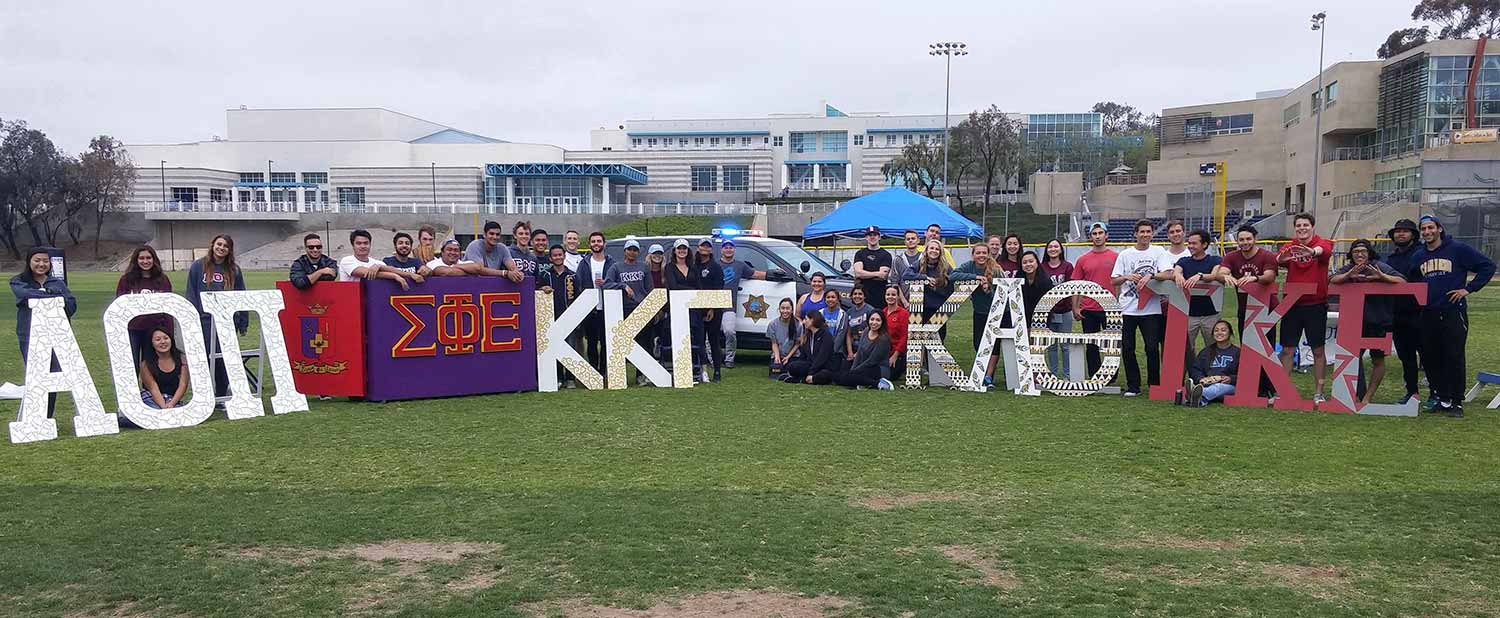
By:
- Laura Margoni
Published Date
By:
- Laura Margoni
Share This:

Photo by Jeremy Miclat
Playing Ball, Building Bridges
It was a cloudy Saturday afternoon when three teams met up at RIMAC Field to play softball. It seemed like an ordinary weekend activity, but these were no ordinary teams and this was no ordinary game. On one side were members of the UC San Diego Police Department. On the other side UC San Diego Greeks. And the stakes?
“Just bragging rights really,” said Manuel “Nel” Garcia, a UC San Diego police officer and one of the organizers of the games. “The whole point was for it to be a friendly competition, a way for us to start building a relationship. We had never done something like this before, but recognized that we needed to do it.”
Jeremy Miclat, a fourth year student and president of fraternity Sigma Phi Epsilon, agreed.
“Nel and I and other Greek leaders realized that the police and the students needed to get to know each other better,” he said. “We want to set a new standard where Greek Life, the police department and the campus at large all have positive relationships and it becomes an environment to grow in, where we can learn and benefit from each other.”
By all accounts, the event was a success. “Well, the police lost all three games we played in,” admitted Garcia, “but the whole thing worked out great overall.” More than 200 students – Greeks and non-Greeks – turned out to play or watch the games as did some 20-30 police department personnel. In addition to the main event, students and police department staff played other games on the field and a number of students took advantage of self-defense training being offered as well.
“Everyone had a great time,” said Miclat. “We accomplished what we set out to do and can now build on that success for the future.”
Like any successful event, the games didn’t just happen overnight. Garcia, who oversees the student Community Service Officer (CSO) program for the police department, has been working on outreach for some time, seeking to build bridges and get students to think of police as more than just a badge.
“We have the power to change things and the potential to affect students in very positive ways,” said Garcia. “But we can’t do that unless we start reaching out to them and talking to them, not at them.”
Under Garcia’s leadership, the police have been hosting various events with student groups such as pizza nights and other informal meet-ups. The students that he trains to be CSOs also act as ambassadors for the police department, engaging with many members of the campus community as they fulfil their duties, which include acting as safety escorts, patrolling parking lots and buildings, and offering additional security at campus events.
“What makes the CSO program work is the people,” said Garcia, who has expanded the program from 18 CSO positions to 107 in the four years since he took it over. “If you teach a student how to be a leader, they will take care of themselves and their community.”
In the future, Garcia says that he hopes to have more relationship-building activities take place on campus. He and fraternity and sorority leaders are already planning another softball game for Greek Week next fall. They hope to turn it into a fundraiser with proceeds going to Mothers Against Drunk Driving.
In the long term, he hopes that the CSO program and other outreach efforts can serve as a model for campuses throughout the UC system as well as local universities.
“UC San Diego can lead the way in building better relationships between police and students,” he said. “It takes commitment and it takes time. But it’s worth it.”
Share This:
You May Also Like
Stay in the Know
Keep up with all the latest from UC San Diego. Subscribe to the newsletter today.


